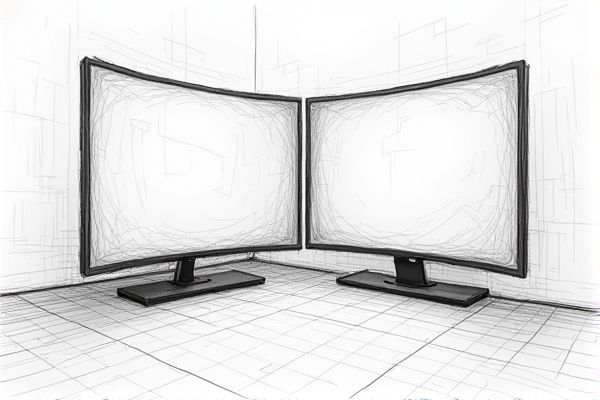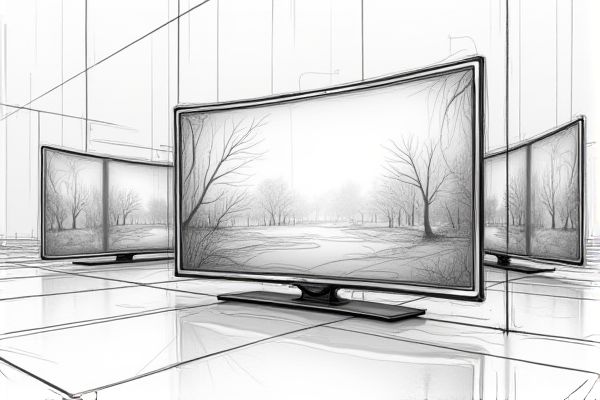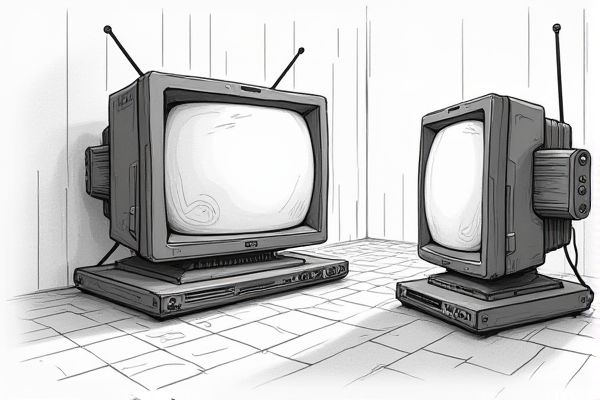In today's rapidly evolving tech landscape, choosing the right smart TV brand can be a fascinating yet challenging endeavor. With a plethora of options to consider, from screen resolution and smart features to sound quality and aesthetic design, selecting a TV that perfectly suits your needs is more critical than ever. Leading the charge in innovation and customer satisfaction, several brands have distinguished themselves through cutting-edge technology and intuitive interfaces. To discover which brands make the top of the list and why they stand out among the competition, explore the insights provided below.

Illustration of smart tvs
Best brands of smart tvs in 2025
Samsung
Samsung Electronics has solidified its position as a leading producer of smart TVs, maintaining its global market leadership for 18 consecutive years since 2006. The company achieved a 30.08% share of the global TV market in 2023, with a significant presence in the premium TV sector, holding a 60.5% market share for TVs priced over $2,500 and a 33.9% share for TVs over 75 inches. Samsung's QLED and OLED models have been instrumental in this success, with the QLED lineup surpassing 40 million cumulative sales since its launch in 2017. The company also captured a 22.7% market share in the OLED sector in 2023. With the introduction of the NQ8 AI Gen3 processor at CES 2024, Samsung is set to further innovate the smart TV domain. For more information, visit the Samsung news page.
LG
LG Electronics stands as a leading manufacturer in the smart TV market, particularly dominating the OLED TV segment with a 52% market share in the first quarter of 2024, shipping approximately 627,000 OLED TV units. LG's OLED TVs, especially the ultra-large models of 70 inches and above, saw a significant increase in shipment share to 14.1%. The company's 97-inch OLED TV holds a 58.4% market share in the 80-inch and larger category. LG's webOS, a Linux-based operating system, enhances the user experience with improved search features and access to global streaming services. In the overall TV market, LG secured a 16.6% revenue-based market share.
Sony
Sony is one of the leading producers of smart TVs, having increased its market share significantly in recent years. As of 2023, Sony holds a 14% market share in the smart TV industry, with notable growth driven by its release of new Google TV Bravia models in 2021. The company's smart TVs, such as the Sony A95L OLED, are praised for their impressive picture quality, wide viewing angles, and advanced gaming features like HDMI 2.1 bandwidth and VRR support. Sony's smart TVs are popular for their integration with modern streaming interfaces and their ability to deliver vibrant colors and deep blacks. With a strong presence in the global market, Sony continues to be a top choice for consumers seeking high-quality smart TV experiences.
TCL
TCL has solidified its position as one of the best producers for smart TVs, capturing 12.6% of the global TV market share in Q1 2024, up from 11.9% the previous year. The company's aggressive marketing and pricing strategies, along with its innovative MiniLED technology, have driven its success. TCL has maintained its second position in the global TV market for two consecutive years, with 25.26 million units shipped in 2023, representing a 12.5% market share. Its premium TV offerings, including the world's largest 115-inch QD-Mini LED TV, have been particularly successful. TCL's expansion into the premium segment has also seen it overtaking LG in some categories. For more information, visit TCL's official website.
Vizio
Vizio is a leading producer of smart TVs, known for its affordable and high-value products. With over 18 million active SmartCast users, Vizio has seen significant growth in its advertising revenue, which increased by 27% annually, driven by its automatic content recognition (ACR) data and Platform+ revenue that accounts for 100% of its gross profit. For more details on their range of smart TVs, visit Vizio's official website.
Hisense
Hisense, a leading global brand in the smart TV market, has maintained the second position in global TV shipments since 2022, with a 13.6% global shipment volume share in the first quarter of 2024. The company dominates the Chinese TV market, holding the No.1 spot in TV sales for 20 consecutive years from 2004 to 2024. Hisense also leads globally in 100-inch TV shipments and laser TV shipments. Hisense's high-end TV models, such as those in the UX series of mini LED TVs, have seen significant growth, with mini-LED TV sales more than doubling in recent years. The company's commitment to innovation and quality has earned it recognition, including eight consecutive years in the Kantar BrandZTM Top 10 Chinese Global Brands list. Hisense's global expansion is supported by its strong brand marketing and overseas supply chain strategies. Learn more about how Hisense maintains global TV market dominance.
Panasonic
Panasonic is a leading producer of smart TVs, renowned for its high-quality offerings. By 2023, Panasonic's smart TV sales were dominated by 1080p resolution models at 50%, followed by 4K at 40%, and 8K at 10%. In May 2023, Panasonic India released 23 new smart TV models powered by the Google TV platform, highlighting their commitment to innovation. The company has also partnered with Amazon to enhance the visual and audio experience of their TVs, catering to various lifestyles and content preferences. With a strong market presence, Panasonic continues to be a significant player in the global smart TV market.
Philips
Philips is a prominent player in the smart TV market, known for its high-quality products and innovative features. The company offers smart TVs with advanced operating systems such as Google or Roku, enhancing the viewing experience. Philips smart TVs are part of a market that is expected to grow significantly, with the U.S. smart TV market projected to reach USD 90.738 billion by 2030, growing at a CAGR of 12.5% from 2024 to 2030. The 4K UHD TV segment, which Philips contributes to, is both the largest and the fastest-growing segment in this market. Philips' commitment to updates and customer support, such as through their 'My Philips' account, ensures that their TVs remain performing at their best. For more details, visit their official Philips TV page.
Sharp
Sharp Corporation is a prominent player in the US Smart TV market, known for its innovative and high-quality products. In 2022, Sharp collaborated with Roku TV to enhance its home entertainment offerings, and it plans to reenter the U.S. TV market with its new Aquos XLED model, featuring advanced color contrasts and high-resolution display. Sharp's history in TV manufacturing dates back to the development of Japan's first commercially produced TV in the 1950s, and the company continues to innovate with technologies like LCDs and Plasmacluster devices. Despite pulling out of U.S. TV sales for general consumers in 2016, Sharp is now focused on regaining market share with its high-end TV sets. The company's commitment to sincerity and creativity has made it a trusted brand in the consumer electronics industry. For more insights, visit Sharp Corporation's feature on Industry Analysts.
Panasonic
Panasonic is a prominent player in the smart TV market, known for its high-quality products. As of 2023, Panasonic's sales share of smart TVs is distributed among various resolutions, with 50% of its smart TVs having 1080p resolution, 40% with 4K resolution, and 10% with 8K resolution. The company's focus on advanced technology and user experience has contributed to its strong market presence. In the global smart TV market, which is projected to reach USD 637.5 billion by 2032, Panasonic remains a significant competitor alongside other major brands like Sony, LG, and Samsung. Panasonic's commitment to innovation and customer satisfaction continues to drive its growth in the smart TV sector.
















Leave a Reply
Your email address will not be published.